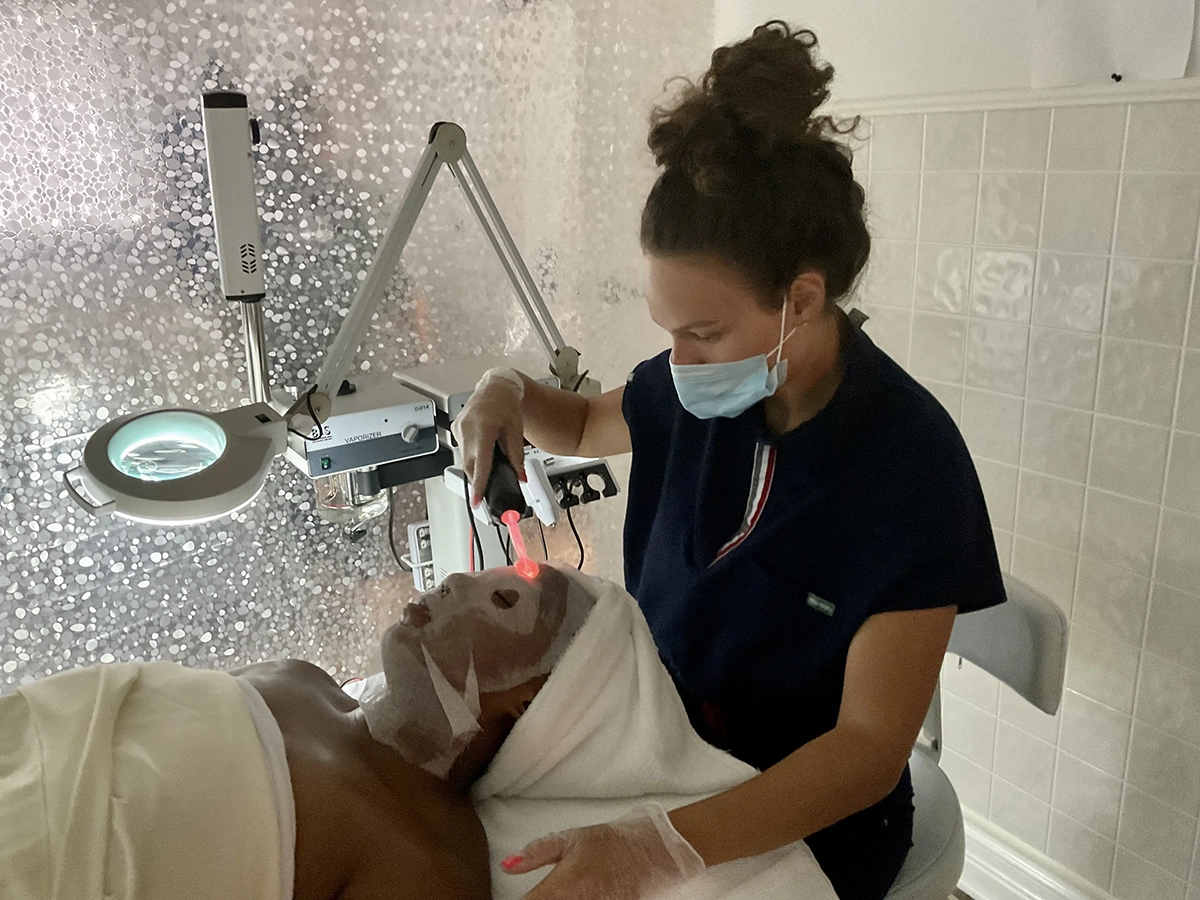To become an esthetician, complete a state-approved program and pass the licensing exam. A career as an esthetician offers opportunities to provide skincare treatments and services.
Estheticians work in spas, salons, and medical offices, helping clients improve their skin health and appearance. To excel in this field, aspiring estheticians must have a passion for skincare and stay updated on the latest trends and techniques. Strong communication and customer service skills are essential for building a loyal client base.
By investing in quality training and gaining practical experience, individuals can embark on a rewarding career as a professional esthetician.
The Role Of An Esthetician
Embark on a rewarding career as an esthetician by completing specialized training in skincare treatments and techniques. Obtaining a state license is crucial to kickstart a successful journey in the beauty industry. Master the art of skincare and bring out the natural beauty in your clients.
If you have a passion for helping people feel confident in their own skin, becoming an esthetician might be the perfect career for you. Estheticians are skincare professionals who specialize in a variety of treatments, from facials to body wraps. They work in spas, salons, and medical offices to help clients achieve their skincare goals. In this article, we’ll discuss the core responsibilities of an esthetician and the career opportunities available in this field.
Core Responsibilities
As an esthetician, your core responsibilities will include providing a range of skincare treatments to clients. This can include:
- Performing facials, chemical peels, and microdermabrasion
- Waxing and threading hair removal
- Applying makeup
- Performing body wraps and scrubs
- Providing consultations to clients to determine their skincare needs
- Suggesting products to clients to help them achieve their skincare goals
In addition to these treatments, estheticians are also responsible for maintaining a clean and safe work environment. They must follow sanitation protocols to prevent the spread of infection and maintain the equipment used in their treatments.
Career Opportunities
There are many career opportunities available for estheticians. Some of the most popular include:
- Working in a spa or salon
- Working in a medical office or dermatology clinic
- Becoming a freelance esthetician and working for yourself
- Becoming an esthetics instructor and teaching the next generation of estheticians
No matter which career path you choose, becoming an esthetician is a rewarding career that allows you to help people feel confident and beautiful in their own skin.

Credit: facemedstore.com
Educational Pathways
Embarking on a career as an esthetician offers a rewarding opportunity to help others enhance their natural beauty and boost their confidence. How to Become an Esthetician? To become a successful esthetician, you’ll need to navigate through the various educational pathways available. Whether you choose a certification program or opt for a degree or diploma, each option has its advantages and considerations.
Esthetician Certification Programs
Esthetician certification programs provide a focused and efficient way to gain the necessary skills and knowledge to enter the field. These programs typically offer comprehensive training in areas such as skincare, facials, makeup application, hair removal, and spa treatments. They are often shorter in duration compared to degree or diploma programs, allowing you to enter the workforce quickly.
During certification programs, you’ll have the opportunity to learn from experienced professionals, acquire hands-on experience, and gain a solid foundation in esthetician practices. These programs often include practical training and internships, enabling you to develop essential skills and build a network within the industry. Additionally, many certification programs offer flexible scheduling options, making it easier to balance your education with other commitments.
Degree Vs. Diploma: Which To Choose?
When it comes to pursuing a higher level of education in esthetics, you may have the option to choose between a degree or a diploma program. Each option has its own advantages, so it’s essential to consider your career goals and personal circumstances before making a decision.
A degree program in esthetics typically offers a more comprehensive and in-depth education. It may include coursework in areas such as anatomy, physiology, chemistry, and business management, in addition to practical training. This level of education can open doors to advanced career opportunities, such as working in medical spas or becoming an esthetics instructor.
On the other hand, a diploma program focuses primarily on practical training and hands-on experience. These programs often have a shorter duration compared to degree programs and can provide a faster path to entering the workforce. Diploma programs are an excellent choice for those who are eager to start their esthetics career sooner and prefer a more hands-on learning approach.
Ultimately, the choice between a degree and a diploma program depends on your individual goals, timeline, and preferred learning style. Both options can lead to a successful career as an esthetician, so it’s important to weigh the benefits of each and choose the path that aligns best with your aspirations.
Required Skills And Traits
Becoming an esthetician requires a unique set of skills and traits that are essential for success in this rewarding career. Whether you’re just starting out or considering a career change, it’s important to understand the key skills and personal traits that make a great esthetician.
Key Skills For Success
As an esthetician, there are several key skills that you need to develop and master in order to excel in your profession. These skills will not only help you provide exceptional service to your clients but also contribute to your overall success in the industry. Here are some of the most important skills to focus on:
- Knowledge of skincare products and treatments: A solid understanding of different skincare products, their ingredients, and various treatment techniques is vital for an esthetician. This knowledge will enable you to assess clients’ needs, recommend appropriate products, and perform effective treatments.
- Technical expertise: Estheticians must possess technical skills to perform a wide range of treatments and procedures. This includes skills such as facial and body massage techniques, hair removal methods, makeup application, and more. The ability to perform these tasks with precision and care is crucial.
- Strong communication skills: Effective communication is essential when working with clients. Estheticians need to be able to listen to clients’ concerns, explain treatments and procedures clearly, and provide aftercare instructions. Building rapport and establishing trust with clients is also important for repeat business.
- Attention to detail: Estheticians must have a keen eye for detail to accurately assess clients’ skin conditions and determine the most suitable treatments. Attention to detail is also crucial when performing procedures to ensure client safety and achieve the desired results.
Personal Traits That Make A Great Esthetician
Aside from the key skills mentioned above, certain personal traits can greatly contribute to your success as an esthetician. These traits will not only help you provide exceptional service but also create a positive and welcoming environment for your clients. Here are some personal traits that make a great esthetician:
- Passion for skincare: A genuine passion for skincare and helping others improve their skin is a driving force behind successful estheticians. This passion will motivate you to stay up to date with the latest industry trends and continuously enhance your knowledge and skills.
- Empathy and compassion: Being empathetic and compassionate allows you to connect with your clients on a deeper level. Understanding their concerns and providing emotional support can make a significant difference in their overall experience and satisfaction.
- Professionalism and ethics: Maintaining a high level of professionalism and adhering to ethical standards is crucial in the esthetics industry. This includes respecting client confidentiality, following proper hygiene practices, and upholding professional boundaries.
- Flexibility and adaptability: The beauty industry is constantly evolving, and being able to adapt to new trends, techniques, and technologies is essential. Estheticians must be open to learning and willing to embrace change to stay competitive in the industry.
By developing these key skills and embodying these personal traits, you can pave the way for a successful career as an esthetician. Whether you’re working in a spa, salon, or starting your own business, these skills and traits will set you apart and help you thrive in this exciting field.
State Licensing Requirements
State licensing requirements are a crucial aspect of becoming an esthetician. Each state has specific guidelines and regulations that individuals must adhere to in order to practice in this field. Navigating the licensing process, renewal, and continuing education are key components that aspiring estheticians need to be well-versed in.
Navigating The Licensing Process
Before embarking on the journey to become an esthetician, it’s essential to familiarize oneself with the licensing process in the specific state of practice. This typically involves completing a state-approved esthetics program, which includes both theoretical and practical training. Additionally, candidates are required to pass a state licensing exam to demonstrate their proficiency in the field.
Renewal And Continuing Education
Once licensed, estheticians need to stay updated with the renewal and continuing education requirements in their respective states. This often involves completing a certain number of continuing education hours to ensure that practitioners are equipped with the latest industry knowledge and techniques. Additionally, staying informed about the renewal process is vital to maintaining an active esthetician license.
Hands-on Experience
When it comes to becoming an esthetician, hands-on experience is a crucial component of the journey. Practical training provides aspiring estheticians with the opportunity to apply their knowledge in real-life scenarios, develop their skills, and gain confidence in their abilities. In this section, we will explore the importance of practical training and how to find internship opportunities to enhance your learning experience.
Importance Of Practical Training
Practical training is essential for aspiring estheticians as it allows them to put their theoretical knowledge into practice. By working directly with clients and performing various skincare treatments, estheticians can refine their techniques and learn how to adapt to different skin types and conditions. This hands-on experience not only helps estheticians develop their technical skills but also enables them to understand the unique needs of each client.
Moreover, practical training provides estheticians with the opportunity to observe experienced professionals in action. By shadowing seasoned estheticians, aspiring professionals can learn valuable tips, tricks, and best practices that can only be gained through real-world experience. This mentorship aspect of practical training can greatly enhance an esthetician’s learning journey, allowing them to gain insights and knowledge that go beyond what is taught in the classroom.
Finding Internship Opportunities
Securing an internship is a valuable way to gain hands-on experience in the field of esthetics. Here are some tips to help you find internship opportunities:
- Research local spas, beauty salons, and skincare clinics that offer internship programs. These establishments often provide opportunities for aspiring estheticians to work alongside experienced professionals and learn from their expertise.
- Reach out to esthetician schools or training centers in your area. They may have partnerships with local businesses that offer internship opportunities to their students.
- Network with professionals in the industry. Attend industry events, join online esthetician communities, and connect with estheticians on social media platforms. By building relationships with industry insiders, you may discover hidden internship opportunities.
- Consider reaching out to local esthetician associations or organizations. They may have resources or contacts that can help you find internship opportunities.
- Don’t underestimate the power of a well-crafted resume and cover letter. Tailor your application materials to highlight your passion for esthetics and your eagerness to learn through hands-on experience.
Remember, securing an internship may require persistence and perseverance. Keep applying, networking, and showcasing your dedication to the field, and you will increase your chances of finding an internship opportunity that will provide invaluable hands-on experience.
Building A Professional Network
Building a Professional Network is essential for anyone aspiring to become an esthetician. Networking provides opportunities to connect with industry professionals, learn from their experiences, and gain valuable insights into the field. It can also lead to job opportunities and help in establishing a reputable presence within the beauty and skincare community.
Networking Strategies
Effective networking strategies can significantly impact your success as an esthetician. Here are some practical approaches to expand your professional network:
Leveraging Social Media
Social media platforms offer a powerful way to connect with potential clients and industry peers. Utilize platforms like Instagram, Facebook, and LinkedIn to showcase your work, engage with followers, and connect with other estheticians and beauty professionals.
Starting Your Own Business
When starting your own business as an esthetician, key steps are crucial.
Creating A Business Plan
- Identify target customers and services offered.
- Determine startup costs and pricing strategies.
- Set short-term and long-term business goals.
Understanding The Market And Competition
Research local market demands and competitors in the industry.
- Analyze competitors’ pricing and services.
- Identify unique selling points for your esthetic services.
- Adapt marketing strategies based on market research.

Credit: newagespainstitute.com
Continual Learning And Specialization
Embark on the journey to become an esthetician by embracing continual learning and specialization in skincare techniques. Expand your expertise through hands-on experience and advanced training to excel in the beauty industry.
Advanced Certifications
Continual learning and specialization are crucial for esthetician career growth.
Trends And Innovations In Esthetics
Staying updated on trends and innovations is vital for estheticians. Estheticians benefit from advanced certifications in specialized areas. Ongoing education keeps skills sharp and enhances service offerings. Specializing in niche areas can attract a loyal client base. Networking with industry professionals helps discover new opportunities. Innovative techniques can set an esthetician apart in a competitive market. Adapting to changing trends ensures continued success in the field.

Credit: m.youtube.com
Frequently Asked Questions
What Is An Esthetician?
An esthetician is a skincare professional who specializes in improving the appearance of the skin. They provide services such as facials, waxing, and makeup application.
How Long Does It Take To Become An Esthetician?
The length of esthetician training programs varies by state, but typically takes around six months to complete. Some programs may take up to a year to finish.
What Skills Do You Need To Become An Esthetician?
To become an esthetician, you should have good communication skills, attention to detail, and the ability to work with different skin types. You should also have a passion for helping people look and feel their best.
What Are The Job Prospects For Estheticians?
According to the Bureau of Labor Statistics, the employment of skincare specialists (including estheticians) is projected to grow 17 percent from 2019 to 2029, much faster than the average for all occupations.
Conclusion
In the competitive beauty industry, becoming an esthetician requires dedication and passion. By following the steps outlined in this guide, you can embark on a fulfilling career in skincare. From obtaining the necessary education to gaining hands-on experience, the journey to becoming an esthetician is both rewarding and promising.


